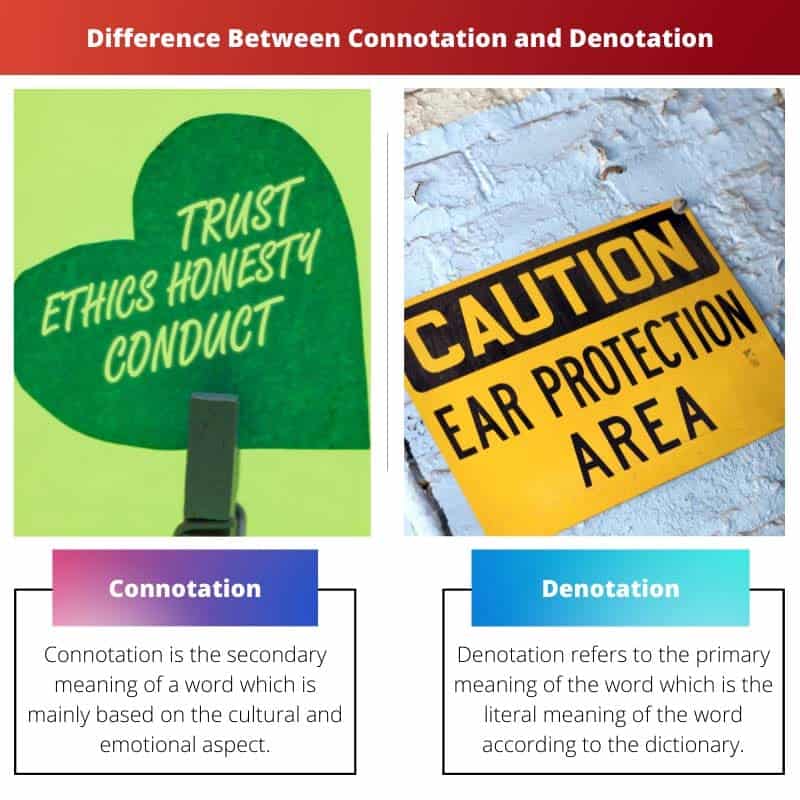A connotation is created when we mention a word with some hidden meaning.
Although connotation and denotation are two important methods to describe a word used in several types of creative writing, what differentiates connotation from denotation is that denotation is the direct meaning of the word.
Key Takeaways
- Connotation refers to the set of emotions, feelings, or ideas a word invokes beyond its literal or primary meaning.
- Denotation refers to a word’s literal or dictionary definition without any emotional or cultural associations.
- While denotation is the objective meaning of a word, the connotation is the subjective meaning influenced by personal experiences, social context, and cultural norms.
Connotation vs Denotation
Connotation refers to the hidden meaning or secondary meaning of a word, mostly from an emotional and cultural perspective or from the view of the reader. Denotation means the literal meaning or primary meaning of a word based on the dictionary. It is a direct meaning based on facts.

Connotation is the secondary meaning of a word based on its emotional perspective, especially from the reader’s point of view. It adds extra meaning to the word depending on the background it is spoken about.
It is used to signify or mean something specific. Denotations are the literal meaning of the respective word.
Comparison Table
| Parameter of Comparison | Connotation | Denotation |
|---|---|---|
| Definition | Connotation is the secondary meaning of a word which is mainly based on the cultural and emotional aspect. | Denotation refers to the primary meaning of the word which is the literal meaning of the word according to the dictionary. |
| Type | It is the indirect and hidden meaning of the word. It contains emotional overtones. | It is the direct meaning of a word. It is factual. |
| Classification | Connotation can be classified into two types, positive and negative. There is also another type of connotation known as the neutral connotation. | Denotation cannot be classified. |
| Effect of culture and religion | Might change depending on the social, cultural, and religious impact of a particular region. | Remains unchanged in respect to the culture and religion of a region. |
| Meaning | Connotations are subjective meaning. | Denotations are the primary meanings |
What is Connotation?
A connotation of a word signifies the cultural or emotional association of the word, which is a little different from the direct meaning of the word. Connotations are the suggestive meanings of a word.
The word connotation has come from the Latin word “connotation”, meaning “signify in addition to the main meaning”. It can either be positive or negative.
Connotation is mainly used to relate how a thing or a set of things can be related to a word or a phrase based on its emotional or social judgment. In other words, the connotation can be described as the feeling or idea of a word.
What is Denotation?
In simple words, denotation may be defined as the literal meaning of a word. The word denotation has come from the Latin word “denotation” meaning “indication” It is similar to the way dictionaries are used to define the word.
The denotation of a word is perceived through visible concepts. In short, the denotation of a word is devoid of feelings or emotions. It can either be an act of using a symbol as well as a word.
Denotation is very important to get a clear view of a particular word, but it is not a good option when it comes to expressing the creative side. Denotation implies the primary meaning of the word.
The writer needs to be observant about his or her word choices, which have to be very precise, as any minor substitution will affect the tone and mood of the writing.
Main Differences between Connotation and Denotation
- Connotation can be classified into mainly two types which are positive connotation and negative connotation. Another type of connotation is also present, which is known as neutral connotation.
- One of the main factors on which the connotation of a word depends is the culture and religion of a particular place.




